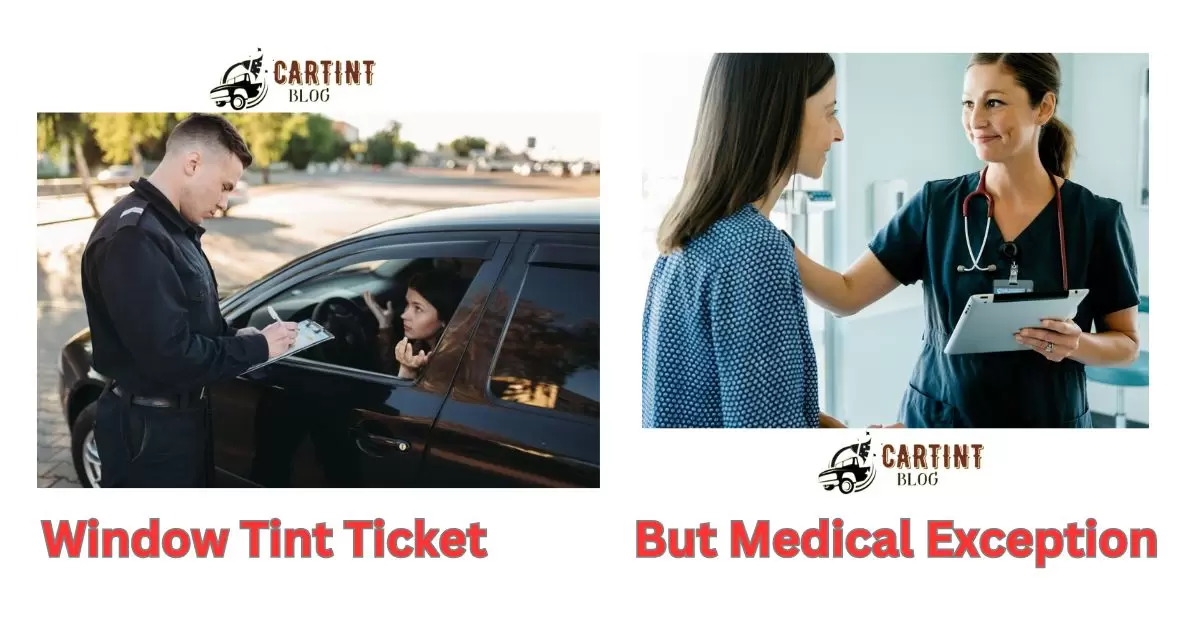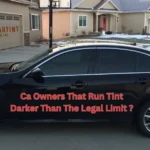Window tint refers to dark tinted film applied to car windows to block sunlight. Most states have laws limiting allowable window tint darkness. Getting a ticket for overly dark window tint is common. However, medical exceptions allow darker tint if a doctor verifies it is necessary for a medical condition.
Window Tint ticket, but medical exception – Just hearing this phrase likely creates intrigue and curiosity. What medical situation would warrant an exception to window tint regulations? The reasoning must be compelling and verified for this special permission.
While window tint darkness is normally restricted for safety reasons, certain medical conditions like lupus can make sunlight exposure hazardous. With a doctor’s signed statement verifying darker tint is medically necessary, people can apply darker window tint and avoid tickets. The process demonstrates how regulations can show flexibility when human health and wellbeing are at stake.
Is my car window tint ticket valid if I have a medical exception?
If you get a ticket for overly dark window tint but have a valid medical exemption, the citation may still stand initially but can be dismissed if you provide your medical waiver documentation in court. You must carry the physician-certified form at all times.
What conditions allow for medical exception to car window tint laws?
Skin diseases, lupus, migraines, retinal issues and photosensitivity disorders are some conditions that may qualify drivers for medical waivers allowing darker car window tint exceeding state limits, with doctor approval.
How do I prove I qualify for medical window tint exception after getting a ticket?
To fight a ticket for overly dark auto tint, present your medical exemption letter signed by a doctor, stating your condition requires extra tinting protection. This certified proof often gets citations dismissed.
What percentage tint is allowed with a medical exception for car windows?
The allowed visible light transmission percentage varies by state but is often 20-35% for front side windows with a medical waiver, darker than the typical 70% state limit.
Can I still get a ticket for window tint on my car with a medical exception?
Yes, you can still be cited initially until you provide officers or the court your physician-certified medical exception documentation allowing the darker tint
Do all states allow medical exemptions for car window tint tickets?
No, not all states allow medical exemptions from their car window tint laws. Based on the search results, some states like Colorado do not permit medical exemptions at all for darker tint.
Other states may have restrictions on how dark the tint can be even with a medical exemption. For example, New York still enforces a 70% visible light transmission limit on front side windows for medical exemptions. So there is variation among states in terms of whether medical exemptions are allowed and how dark the tint can be.
For instance, in California, owners that run tint darker than the legal limit should be aware that regulations specify the permissible visible light transmission for vehicle windows. While the specific limits may vary for different windows, adhering to these guidelines is crucial to avoid potential fines or penalties
What medical criteria do states use to exempt car window tint tickets?
- States have different laws and regulations regarding window tint medical exemptions. Some states, like Washington D.C. and West Virginia, permit medical exemptions for specific conditions, requiring documentation of the medical necessity and the duration of the exemption. However, a few states, including Colorado and Ohio, do not accept medical exemptions for window tints
- Medical criteria for exemption from car window tint tickets vary by state. Qualifying medical conditions for exemptions typically include melanoma, lupus, allergy to sunlight, albinism, photosensitivity, xeroderma pigmentosum, vitiligo, autoimmune disorders, and cancer. The specific VLT (visible light transmission) percentages permitted for window tints also differ by state, with some states requiring windshields to have over 70% VLT under a medical waiver, and other windows to have no less than 25% VLT
- Medical authorization for window tinting requires a physician’s signed statement, and in most cases, a vehicle tint-waiver request form needs to be filled out. The approval for window tints due to medical conditions is often between 20 and 32 percent VLT. It is essential to carry the validation form at all times while driving to ensure compliance with the regulations
- Some states, such as Georgia, have specific application processes for obtaining a medical exemption to the window tint law. The physician’s or optometrist’s letter must explain why the medical reason for requesting a window tint exemption is a condition that can only be addressed by darker window tints. Conditions that can be addressed through the use of protective eyewear or the use of window tint within legal limits that block 99.9% of UV light are not eligible for a window tint exemption.
- Federal window tint laws also outline exemptions for certain vehicles, such as limousines or government vehicles. These exemptions may vary by vehicle type and are subject to federal regulations
Which states recognize medical exemptions to window tint laws for cars?
The search results provide examples of some states that allow medical exemptions for window tint including Connecticut, Delaware, Florida, Massachusetts, and New York5. To qualify for the exemption, states generally require certification from a medical professional documenting the medical need for darker tint.
Photosensitivity conditions, eye disorders, and skin cancer risks are some common medical justifications. So a number of states do provide medical exemptions, but each has its own specific eligibility criteria and application process.
How do exemption rules differ across states for car window tint violations?
The exemption rules for car window tint violations vary across states. Some states allow medical exemptions for specific conditions such as melanoma, lupus, and photosensitivity, while others do not recognize them.
For instance, eight states, including Colorado and Ohio, do not accept medical exemptions for window tints. Additionally, the specific VLT (visible light transmission) percentages permitted for window tints differ by state, regulating how much light can pass through the tint. Below is a table outlining the VLT percentages allowed for window tints in different states:
| State | Front Sides | Rear Sides | Rear Window | Windshield |
| AL | 32% | 32% | 32% | 6″ |
| AK | 70% | 40% | 30% | 5″ |
| AZ | 33% | ANY | ANY | AS1 |
| … | … | … | … | … |
This table provides a glimpse of how the VLT regulations vary across different states, impacting the permissibility of car window tints
When can I not use a medical excuse for car window tint tickets?
For states not recognizing medical exemptions at all like Colorado, medical excuses cannot be used to avoid window tint citations. If the medical certification does not clearly document an eligible condition or the exemption has expired, the excuse may not be valid depending on the state.
Failing to properly display an exemption approval sticker or form can also invalidate a medical excuse defense. So there are a number of scenarios where medical excuses either do not apply or may not suffice based on specific state car window tint laws and exemption policies.
What documents do I need to fight a ticket for illegal car window tint?
To fight a window tint ticket, you will need an official medical exemption permit from the DMV allowing you to have tinted windows due to a medical condition, as well as documentation like a doctor’s note detailing your condition. You should also bring photos showing the car’s VIN number and license plate to prove it is your vehicle. 2
Is a doctor’s note enough to beat a ticket for car window tint?
No, a doctor’s note alone is typically not enough to beat a window tint ticket. You need an official medical exemption permit from the DMV in addition to a doctor’s note to show that you have a legitimate medical need for tinted windows.
Will a state’s medical exemption form prevent window tint citations for my car?
Yes, having a valid medical exemption form for window tint from your state’s DMV should prevent you from being cited if you are pulled over. You need to keep the permit in your glove box and present it if stopped.
What other proofs should I bring to court for a car window tint ticket?
In addition to the medical exemption permit and doctor’s note, you should bring photos of your car showing the VIN, license plate, and window tint level to prove it is your vehicle and the tint complies with regulations based on your permit.
Can cops still issue tickets if my car windows have medical exemption decals?
No, police should not issue window tint tickets if you have valid medical exemption decals properly displayed on the car windows. But you need to present the permit if stopped to show the tint is allowed due to a documented medical necessity.
How much do fines cost for car window tint violations without an exemption?
The average nationwide fine for a first offense of illegal car window tint is around $100, with some states like California issuing fines up to $250. Subsequent offenses typically double the fine, so a second ticket can cost over $200 and a third ticket over $350 in states like Louisiana. Without a medical exemption, it is illegal to have darker tint than the legal limits which vary by state.
What is the average nationwide fine for illegal window tint on a car?
The average fine nationwide for a first offense of illegal car window tint is approximately $100. However, fines range from as low as $25 in states like Connecticut to up to $250 in California for a first offense. Subsequent tickets rapidly increase to over $200 or more in most states.
Which states impose the highest fines for car window tint violations?
States with the highest initial fines for illegal car window tint include California at $250, Arizona at $250, and Arkansas with fines starting at $1000 and potential jail time. Subsequent offenses in Louisiana can reach $350 each. Fines over $500 are possible in Colorado depending on the specifics of the offense.
What circumstances lead to maximum fines for illegal tint on car windows?
The maximum fines result from repeat offenses, especially a third or higher offense of illegal window tint. States like Louisiana fine up to $350 for a third offense and subsequent tickets. Particularly dark tint below legal limits or windshield tint can also incur maximum fines over $500 in states like Colorado. Jail time is also possible for excessive violations in states like Arkansas.
Is it cheaper to remove tint or pay the ticket if caught without medical exemption?
It is always cheaper to remove illegal window tint instead of paying multiple tickets if caught without a medical exemption. The cost of removing tint is typically under $100 while repeat offense tickets can cost $250-350 each in many states. Paying multiple tickets is more expensive than removing the tint.
Should I get legal advice to fight a car window tint ticket with medical issues?
Yes, you should consult a traffic ticket attorney if you have medical issues that require darker window tinting. An experienced lawyer can help get your ticket dismissed by providing evidence of medical necessity and your state’s exemption laws. They can also negotiate reduced fines if the ticket can’t be completely dismissed.
Will a lawyer help get an illegal car tint ticket dismissed for medical problems?
Most states allow medical exemptions for darker window tint, so a lawyer can argue for dismissal by showing evidence you qualify. This may include an affidavit from your doctor and photos proving your car’s window tint level. If your state has no medical exemptions, a lawyer can still seek to reduce fines and penalties.
What medical proofs must I show a legal expert to beat a car window tint citation?
You’ll need an affidavit from your doctor explaining the medical issues requiring darker tint, plus testing results proving your car’s windows meet the darkest legal medical exemption in your state. Photos matching your ticket details to the medical paperwork may also help.
How much do lawyers typically charge to fight a ticket for non-exempt window tint?
Fees vary, but expect $200-500 for legal help dismissing or reducing an illegal tint ticket. Rates depend on your location, the lawyer’s experience, and how much work fighting your ticket requires. The cost is usually worth avoiding increased insurance and repeat offense fines.
Frequently Asked Question
Can I get a ticket for window tint even with a medical exemption?
Yes, you can still receive a ticket for window tint, but if you have a medical exemption, you can present it in court, and the judge may dismiss the ticket.
What are the requirements for a medical exemption for window tint?
The requirements for a medical exemption for window tint vary by state. In most cases, a physician’s signed statement stating the medical necessity for darker window tint is necessary.
How long is a medical exemption for window tint valid?
Certificates for medical exemptions are typically valid for as long as the medical condition persists or until the vehicle is sold.
Which medical conditions may qualify for a window tint exemption?
Medical conditions such as vitiligo, xeroderma pigmentosum, dermatomyositis, lupus, albinism, and other autoimmune diseases may qualify for a window tint exemption in certain states.
What if my doctor denies my request for a medical authorization for window tint?
If your doctor denies your request for a medical authorization, you may be referred to the Medical Review Unit, and tinting less than the specified percentage may not be considered valid.
Conclusion
If you have received a window tint ticket but have a medical exception, it’s important to handle the situation carefully. You should gather all necessary medical documentation to support your exception and be prepared to present it to the authorities. Additionally, it’s advisable to familiarize yourself with the specific window tint laws in your area to ensure compliance with any regulations.
Dealing with a window tint ticket in the context of a medical exception requires attention to detail and adherence to legal requirements. By proactively addressing the issue and providing the appropriate documentation, you can work towards a resolution that takes your medical needs into account while also respecting the law.



